|
In Town Tonight
The 2015 winter social season got off to a sparkling start with a tightly-packed crime fiction party in the penthouse boardroom of publisher Hodder. In fact it was such a busy party it was difficult for an elderly gentleman such as me to get around and chat to all the talented Hodder people I wanted to.

For example, it was impossible to do anything other than “photo-bomb” talented historical spy writer Andrew Williams as he was mobbed by adoring fans, though in a quieter moment I did manage to congratulate Rory Clements on the fabulous production job Hodder has done of his (surely) bestselling Holy Spy which is published at the end of this month.
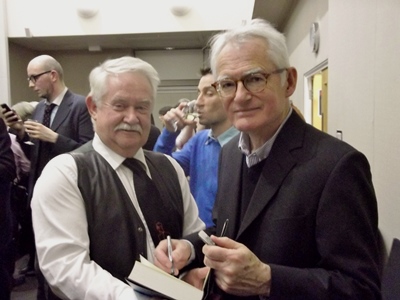
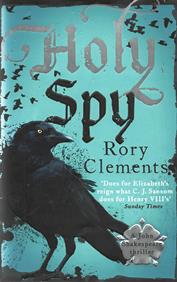
In one of the rare moments of calm, along with Shots’ very own Ayo Onatade and my fellow boulevardier Marcel Berlins, I did manage to exchange a few words with my old chumette Lindsey Davis, though I did not get a chance to discuss her new novel Deadly Election which comes out in April (and is too-briefly mentioned later on in this column).
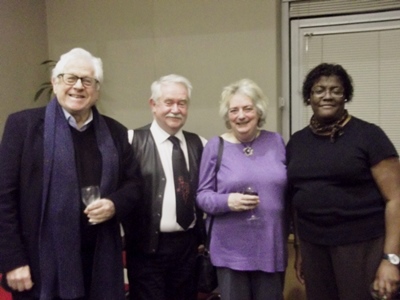
But the real joy of such occasions, which crime fiction reviewers and commentators attend out of a sense of duty whatever the cost to their personal health, is meeting a new arrival on the scene and being persuaded to read their books. I am ashamed to say I was totally unaware of S.D. Sykes’ medieval mystery Plague Land which came out last year, but as soon as I noticed this striking book on display, I tracked down author Sarah Sykes so that we could exchange notes – as one often does at parties – on the effect of the bubonic plague on England in 1348. I am resolved not to miss her next novel from Hodder, The Butcher Bird, which is scheduled for October.
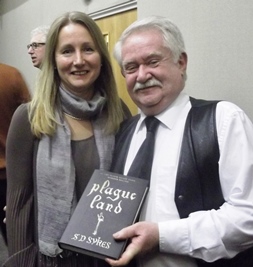
P-p-p Penguin P-p-p Party
I am looking forward to that other popular fixture on the social calendar, the Penguin Crime Drinks party which I was unable to attend last year due to commitments overseas and Prince Ali Karim had to attend as my representative. Fortunately those perky Penguin people have generously short memories and I have been invited back.
Last year, Penguin’s initiative to produce proofs of its crime output in their famous green paperback livery, brought a tear to the eye of one who was introduced to Raymond Chandler, Margery Allingham, Michael Innes and many more superb crime writers through those iconic ‘green penguins’ and in every second-hand bookshop, that moist eye always scans the shelves trying to spot green to this day.
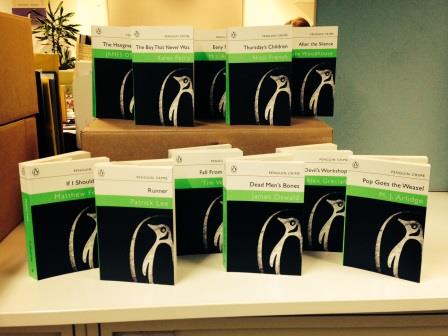
I was surprised, therefore, not to see a green proof of the new novel by Penguin’s latest superstar James Oswald. My sources inside Penguin (can one have a ‘penguin mole’?) tell me that Oswald, after four very successful thrillers in his Inspector McLean series, is now such a ‘treasured author’ that Penguin are publishing his latest in hardback for the very first time and Prayer for the Dead should be out any day now.
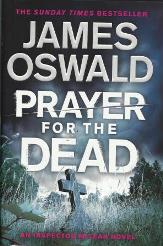
Film Fun
I was in the Four Ale bar of The Platelayers’ Arms the other night enjoying a contemplative pint of Gutteridge’s Old Peculiar when a fellow local caused quite a stir by announcing the news that the classic British film Zulu so dear to English and Welsh hearts had been remade, starring Orlando Bloom and Forest Whitaker. For a moment you could have heard a pin drop and then the pub’s would-be film expert was bludgeoned into submission and forced to admit he had made a terrible mistake.
It turns out that this month sees the DVD release of a South African-set crime thriller called Zulu, based on the book of the same name by French writer Caryl Ferey, which was published in the UK by Europa in 2013, the same year the film was premiered at the Cannes Film Festival.
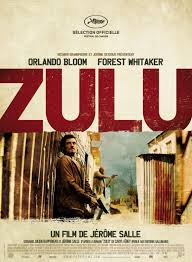
I am uncertain whether the film ever got cinema release in the UK (or the US) but it certainly did in many parts of the world, where it was alternatively known as City of Violence or Cape Town Cops.
Nice one, Kyril
One film which, for good or ill, is unlikely to go unnoticed – mainly because it stars my East Anglian neighbour Johnny Depp – is Mortdecai which as any true mystery fan knows, is based on the books by the improbably-named Kyril Bonfiglioli.
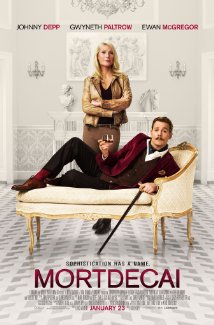
Not a name easily forgotten once learned, Kyril (Charles Emmanuel George) Bonfiglioli [1928-85] wrote barely a handful of comic crime novels between 1973 and 1979 featuring his aristocratic and possibly psychopathic art-dealer/thief hero Charlie Mortdecai which became almost instant cult classics and which have recently been returned to print by Penguin.
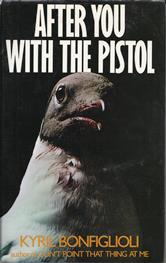 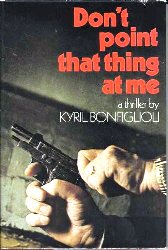
Not only have the books had a faithful celebrity following over the years, but Bonfiglioli’s debut in 1973, Don’t Point That Thing At Me, won the first-ever John Creasey Award from the Crime Writers Association. I believe it was also the first time (and some may say also the last) that the CWA gave an award to a comic crime novel.
Return of the Screw
I fail to understand why the superb French cop drama Engrenages – or Spiral as it is known on BBC4 – has never caught on with the chattering classes here as much as some of the overblown, dour and darkly-lit Scandinavian dramas imported in the past, but I am delighted to say that the fifth series is now up and running here on Saturday nights, although real-life horrific events in Paris last month put all fictional dramas into grim perspective.
{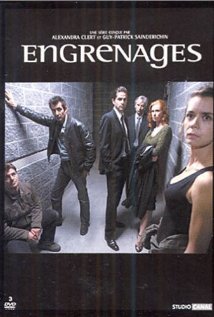
Spiral (the French title refers to the grinding of multiple gears in the course of a crime as it affects criminals, police, lawyers and the judiciary) has amazing production values, great plot-lines and, above all, brilliant characters superbly played by an ensemble cast with not a weak link among them. The two female leads are particularly striking: Caroline Proust as the tough, dedicated cop and Audrey Fleurat as the even tougher, slightly dodgy lawyer who seems to delight in taking on the police. Watch out also for Thierry Godard as detective ‘Gilou’, who gives a performance which reminded me of Dennis Franz playing both Sal Benedetto and Norman Buntz in Hill Street Blues all those years ago.
New Names
The author of The Whites, a New York crime thriller published by Bloomsbury this month, may seem to be marking the arrival of a new name – Harry Brandt – in crime writing.
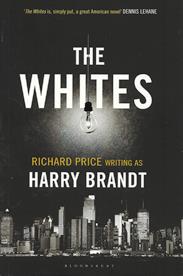
Nothing could be further from the truth for ‘Harry Brandt’ is the pen-name of Richard Price, whose first novel was published over 40 years ago, is the author of the highly-acclaimed Clockers and who has worked as a scriptwriter on films such as The Color (sic) of Money, Mad Dog and Glory, Shaft (the remake) and the forthcoming Child 44 as well as contributing numerous scripts to the iconic television series The Wire.
A name which probably will be new to anyone unfamiliar with American “sports” (which doesn’t narrow it down) is that of Kareem Abdul-Jabber, the 7’2” tall retired basketball hero and author of several children’s books, who has now turned his hand to crime fiction. As befits an athlete of his height, he’s aiming high with his debut mystery, written in partnership with Anna Waterhouse, by featuring as his hero Sherlock Holmes’ older (smarter?) brother, Mycroft.
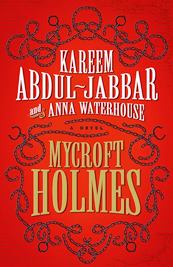
Titan Books are already enthusing about their latest acquisition, even though Mycroft Holmes is not actually published until October. Between now and then I am sure my readers will be able to acquaint themselves with Kareem as they will spot him in the oft-repeated (but still funny) film Airplane! where he played one of the co-pilots to the dead-pan Peter Graves as Captain Oveur.

Top Title
The reissue by Pan of a thriller which first appeared in 1982 caught my eye this month, partly because the author Peter James is now a million times better known than he was 33 years ago, but mainly because Atom Bomb Angel is such a splendid title and one I feel strangely attracted to for reasons I don’t fully understand.

Atom Bomb Angel was Peter James’ second published novel and in a very amusing – and very honest – introduction he tells of the struggles of a new author attempting to promote his own work by hiring professional publicists and going on a national promotional tour, only to be brought back to Earth when he worked out that his (then) publisher had only printed 1,750 copies and 1,600 had gone to public libraries.
Peter even cites the old joke among writers that unsigned copies of a crime novel might prove the most valuable due to their rarity. However, I have news for him, for a book dealer in Eastbourne is currently advertising for sale a signed first edition of Atom Bomb Angel (complete with an invitation to the launch party at Hannington’s in Brighton on 18th February 1982) for the very reasonable sum of £500.
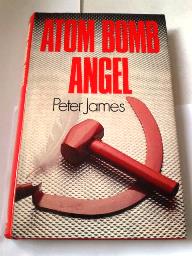
|
|
Noir Domestique
The intelligent reader of crime fiction suffering withdrawal symptoms following the discontinuation of Sarah Weinman’s most excellent blog Confessions of an Idiosyncratic Mind can rest easy, for the mystery fan who almost single-handedly gave blogging a good name, is back with a weekly posting called The Crime Lady [https://tinyletter.com/thecrimelady].
In launching the new blog Sarah takes on the topic of ‘domestic suspense’- the growing number of crime novels being rushed out by publishers (mainly British) in the wake of the success of Gone Girl and Before I Go To Sleep. It is, of course, not a new sub-genre of crime fiction, but Sarah, who knows her stuff, has detected a new tone in the sort of noir fiction which usually involves a woman under threat (or imagined threat) from close family members, friends or close acquaintances and a fashionably unreliable narrator. It is not a tone she likes. I quote verbatim apart from minor interruptions:
This is where my deep reading of older books comes in. Even if you leave out the Grandes Dames of the Golden Age -- Christie, Sayers, Allingham, and Marsh, and Tey, all in the UK Commonwealth, all but one British -- and look later in the 20th century to PD James (RIP), Ruth Rendell, Celia Fremlin, Celia Dale, and Joan Fleming {and Margaret Yorke?} -- at their best they combined the terror of the mundane with a clarity of vision about their chosen milieu, however narrowly drawn. When their characters acted or made choices they felt, no matter how wrong-headed, rooted in some logic. Most of all, their narrators didn't whine. Too much of the current crop of UK domestic suspense is in this 1st person whiny, wheedling voice, bordering on TSTL. {Translator’s note: “Too Stupid To Live”} I can't care about whether your narrator is unreliable if her voice grates on me like the proverbial nails on chalkboard. I don't even blame the authors per se. But clearly whomever is selling and acquiring {i.e. publishers} is so concerned with following a trend they forget what made those earlier books amazing, probably because they never necessarily read those books in the first place.
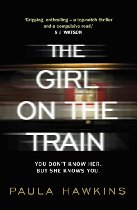
It is a thoughtful piece and was sparked by the debut novel of Paula Hawkins, Girl On A Train, which came out last month and which everyone in Christendom seems to have seen except me. I cannot, therefore, comment on that novel (though not reading one has never stopped me before) but I do take umbrage at publishers and publicists shrieking about ‘unreliable narrators’ as if they had only just been invented. I always thought Agatha Christie wrote a rather good book with one back in 1926 called The Murder of Roger Ackroyd.
Paula Hawkins’ novel has been described as “Rear Window meets Gone Girl” and comes with a cover endorsement from S.J. Watson and I actually have read what is sure to be this month’s bestseller, his new novel Second Life (Doubleday), but whether its narrator is ‘unreliable’ or ‘TSTL’ I am simply not sure.
I found Second Life a distinctly uncomfortable experience. It is certainly suspenseful though there were many occasions when I could have happily slapped the central female character for not seeing the plot twists coming (in the same way that I often shout at Scandinavian television dramas: ‘Turn the bloody lights on!’). At other times I felt distinctly guilty because I had the creeping impression I was reading somebody’s mental health case file and the suspicion that the narrator was not so much ‘unreliable’ as bat-shit crazy from the outset. In fact there were a lot of things about drug-and-drink damaged Julia, the narrator/protagonist I didn’t like, especially her masochistic sex life – but perhaps that was the point and I missed it.

There is, as Sarah Weinman would say, a lot of whining and wheedling in this narrative voice and I found it difficult to care for the central character as she suspends disbelief (somebody has to) and allows herself get into situations which most sensible people would have run a mile from – or at least turned the lights on.
It is, however, written with great pace and a shameless sleight-of-hand that is impossible not to admire, and I am sure Mr Watson will be laughing all the way to his bank, which by now is probably in Jersey or Switzerland.
And “for those who loved Before I Go to Sleep [and] Gone Girl” – or so the press release claims – the next big thing is supposed to be What She Left, a debut “masterstroke of psychological suspense (it says here) from T. R. Richmond, to be published in April by Michael Joseph. (Note the use of initials rather than Christian names, just like S.J. Watson. Coincidence?)
In a previous age, this would have been classed as an ‘epistolary novel’ but nowadays I suppose we have to call it a ‘social media novel’. It is bang up-to-date rather than ground-breaking as a technique. The late divine Sarah Caudwell built more than one of her wonderfully comic crime novels around letters, another around a series of faxes and even (I think) telex messages. Had she lived longer, and learned how to turn a computer on, I am sure she would have got around to emails and ‘tweets’, whatever they are, eventually.
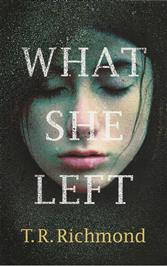
The idea behind What She Left is basically what ‘footprint’ (electronic messages, journals, letters etc.) young journalist Alice Salmon leaves behind after her suspicious death by drowning and can an ageing academic (sensing a bestseller?) cut and paste these fragments into a book to explain her life and, more importantly, her death? All forms of social ‘meeja’ are covered: emails, voicemails, tweets, blog posts, text messages, web forums, comments on blogs, phone messages and so forth, none of which I am competent to comment on. There are also, however, hand-written letters cited and here I feel more comfortable, being someone who is regularly appalled at the price of a first class stamp and who writes with a fountain pen. I feel I have to point out though that people who write letters rarely in my experience need to remind themselves who they are writing to by mentioning the addressee’s name repeatedly in the letter. (e.g.: “Dear Julian, It must be a year, Julian, since we last met. However, I know that someone as astute as you, Julian, will not hold a grudge. Yours sincerely, Sandy.”) Only PR people with the memory of a gnat or call centre trainees wishing to inform you about PPI mis-selling do that.
If you can stick with the multiple forms of narration (rather than a single unreliable narrator, this book about a book could probably be said to have an ‘unreliable editor’ rather than a narrator) and the timeline which jumps back and forth from 2004 to 2013 with irritating frequency, then you’ll definitely want to know what happened to Alice Salmon after following the ‘footprint’ she has left behind.
Curiously, though, the author T. R. Richmond, who is described as “an award- winning journalist” does not seem to have left any electronic footprint at all and despite numerous Googlings (if that’s a word), I could find out nothing about her, or him. That famous quote from The Usual Suspects springs to mind: The greatest trick the Devil ever pulled was convincing the world he didn't exist.
Even before this column is sent to the hot metal typesetters, or whatever it is they do these days, a copy of A Line of Blood by Ben McPherson in advance of its publication by HarperCollins in March arrives on my desk.

The accompanying publicity tells me – you’ve guessed – that this debut novel of ‘domestic suspense’ is “Perfect for fans of Gone Girl and Before I Go To Sleep”. I can hardly wait.
Going Foreign
As is well known, this column believes in trying everything once, with the possible exceptions of Morris Dancing and Country & Western music, and that includes a crime novel based on a famous Romanian fairy tale about ogres who have stolen the sun.
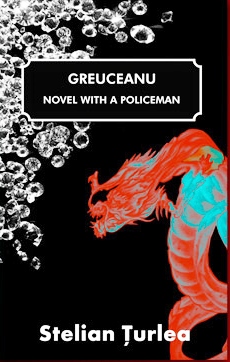
Greuceanu – Novel With A Policeman by Stelian Turlea, a distinguished Romanian writer, editor and television journalist, is to be published by Profusion. It will be Turlea’s first novel to be published in English and I am given to understand that one of its translators is none other than my old chum Mike Phillips, whose first crime novel to feature investigative journalist Sam Dean, Blood Rights, was filmed for the BBC in 1990.
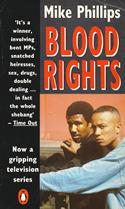
In June, we are promised a bestselling German psychological thriller from Simon & Schuster although I am not sure which cover they will use; perhaps both, which would seem to be absolutely in character with the protagonist Henry Hayden.
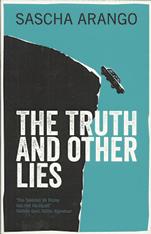 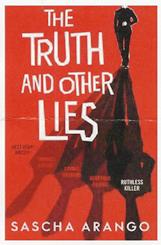
Described in one German review as the equal to Patricia Highsmith’s Tom Ripley, Henry Hayden is a sociopath and, naturally, a best-selling author and the anti-hero (?) of the debut novel The Truth and Other Lies by Sascha Aranago, an experience screenwriter for German television.
I am looking forward to it as another reviewer has labelled it “Ripley light” which makes it irresistible, at least to me.
Old Codgers
I have always found Christopher Fowler’s quirky, slightly skew-whiff take on London as seen through the misty eyes of his detective duo Bryant & May (younger readers may have to have their name explained to them by old former smokers) of the Peculiar Crimes Unit to be irresistible. Therefore I am delighted that another in the series, The Burning Man will be published by Doubleday in March.
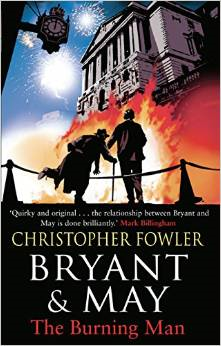
I have been allowed a sneak preview and one of my favourite exchanges is when detective Arthur Bryant confronts a witness who claims to have enjoyed Fifty Shades of Grey. Bryant quails and responds: “That’s not really reading, is it? More like staring at an assortment of words”.
The Spies Have It
I am indebted to that colourful and informative (at least I am sure I would find it informative if I spoke Spanish) website Una plaga de espias, which I am told translates as ‘A Plague of Spies’, for the following illustrations of what might be called ‘continuation fiction’ though to the less charitable among us, the word ‘exploitation’ might spring to mind.
The exploits of James Bond are, of course, no stranger to ‘continuation’ and even though his original author died over 50 years ago, several distinguished authors have taken on Ian Fleming’s mantle (Amis, Gardner, Faulkes, Deaver, Boyd etc.). I have absolutely nothing against this trend and have even suggested that it is about time J.K. Rowling was given a go at the franchise, should she wish it.
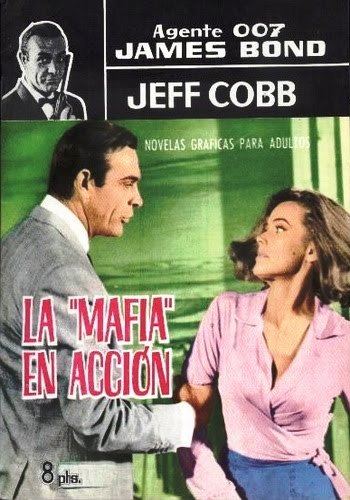 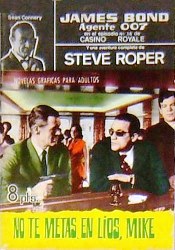
But I have to raise an eyebrow - Roger Moore style of course - when I see James Bond books (at least I presume they are) by ‘Jeff Cobb’ and ‘Steve Roper’, albeit that they were published in Argentina. They have, I suspect, rather cheekily, used images from the Bond films. Jeff Cobb’s The Mafia in Action clearly uses a still from Goldfinger, although Steve Roper’s Don’t Get into Trouble, Mike seems to have got things rather confused, unless I missed the film where Robert Ryan (the excellent American actor rather than the excellent British thriller writer) played 007.
Wine and Crime
The current snap of cold weather means I am counting the days to when I will be officiating at the second Chianti Crime Festival in Italy in the first week in May.

So generously sponsored by the Chianti producers of Tuscany, this is undoubtedly my favourite crime writing convention. I know that some commentators on the genre prefer other locations – that cosmopolitan man about town Peter Guttridge, for instance, regularly participates in sea-going conventions on cruise ships plying the Aegean, whilst Professor Barry Forshaw is never happier than when wearing snowshoes and yomping over an Icelandic glacier.

I am far too old for such energetic pursuits and these days prefer my crime conventions rather more relaxed. I am particularly looking forward to Chianti Crime Fest II in beautiful and historic Siena as I understand one of the surprise guests may well be the excellent British thriller writer John Lawton, who is seen in public not often enough these days.
Eternal City
If you are unfortunate enough not to be in Siena in May, you have no excuse for not being in Rome in April.
To be absolutely accurate (for once) I should have said Rome in July, and July in the year AD89, as that is the setting for Lindsey Davis’ new historical mystery Deadly Election.

Published by Hodder on 9th April, Deadly Election is the third case for Flavia Alba, the feisty adopted daughter of Ancient Rome’s most personable sleuth Marcus Didius Falco.
Suspects
The news that my contractual obligation to Shots as ‘trade columnist’ technically ends next month with Column #100 has already brought in numerous applications even before details of the vacancy have been advertised.
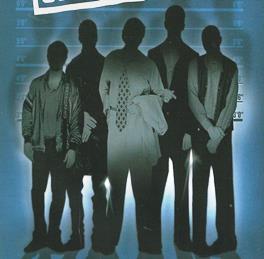
Thanks to the Freedom of Information Act, and with the co-operation of Operation Yewtree, I hope to highlight the leading contenders next month….
Toodles!
The Ripster
|